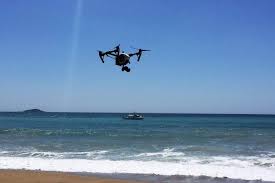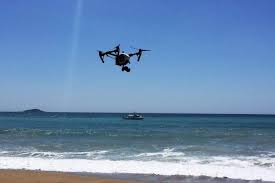
Following a series of attacks on surfers, shark-tracking drones are being deployed to protect Australia’s beachgoers.
As part of a strategy by the New South Wales (NSW) government, the trial for the new technology would begin next week.
The new technology would also see hi-tech drum lines installed to allow sharks to be hooked, tagged and released further out to sea. With the first field tests being conducted off Coffs Harbour, about 285 miles (380km) south of Brisbane, the drones will feed images with GPS coordinates back to operators looking for sharks.
Ballina would be the first place where the first of the drum lines will be installed. This is place where a surfer from Japan, Tadashi Nakahara, 41, was killed by a shark in February and a 20-year-old local surfer, Sam Morgan was bitten by a bull shark earlier this month.
Unlike traditional lines that are checked intermittently, the baited drum lines, instantly alert monitors when a shark has been hooked so it can be swiftly released and moved, unlike traditional lines that are checked intermittently. These types of drums have been used in the shark-infested waters of Réunion Island, east of Madagascar.
As the main summer holiday season gets under way, helicopters would also be put into service. There have also been political clamor about how to balance protecting swimmers and surfers while acting in the best interests of the sharks.
With 20 listening stations being built along the NSW coast at known shark attack locations, the trials are part of a $16m (£7.7m) five-year strategy to combat shark attacks that will include real-time tracking of tagged sharks using 4G technology.
All members of the public will receive shark alerts in near real time on mobile phones and tablets through an app, called SharkSmart. Eco-friendly barrier nets will also be installed.
There was no easy way to reduce shark attacks, but the government’s approach was to use available science and emerging technologies, said Niall Blair, the NSW minister for primary industries.
In total there have been 14 shark-related incidents, one fatal, on the NSW north coast this year.
“These are the first of several trials that will get under way across the state’s beaches this summer as we take an integrated approach to working out a long-term solution,” Blair said in a statement.
The hi-tech drum lines were more humane than the traditional lines that have been used in Queensland and Western Australia Blair told the local media.
“They’re like a baited hook that has technology connected to it so when the bait is taken, a message is sent to our vessels and they’ll attend those lines immediately,” he said.
“They will then tag and release the sharks that are caught on those. So they’re very different to the traditional drum lines which could have sharks sitting on them for days before they’re checked,” Blair added.
The approach was based on science, not emotion said the NSW premier, Mike Baird.
“The experts have told us these are the technologies that have the potential to lead to a long-term solution to keep our beaches safe and minimise the impact on marine life,” Baird said.
(Source:www.theguardian.com)
As part of a strategy by the New South Wales (NSW) government, the trial for the new technology would begin next week.
The new technology would also see hi-tech drum lines installed to allow sharks to be hooked, tagged and released further out to sea. With the first field tests being conducted off Coffs Harbour, about 285 miles (380km) south of Brisbane, the drones will feed images with GPS coordinates back to operators looking for sharks.
Ballina would be the first place where the first of the drum lines will be installed. This is place where a surfer from Japan, Tadashi Nakahara, 41, was killed by a shark in February and a 20-year-old local surfer, Sam Morgan was bitten by a bull shark earlier this month.
Unlike traditional lines that are checked intermittently, the baited drum lines, instantly alert monitors when a shark has been hooked so it can be swiftly released and moved, unlike traditional lines that are checked intermittently. These types of drums have been used in the shark-infested waters of Réunion Island, east of Madagascar.
As the main summer holiday season gets under way, helicopters would also be put into service. There have also been political clamor about how to balance protecting swimmers and surfers while acting in the best interests of the sharks.
With 20 listening stations being built along the NSW coast at known shark attack locations, the trials are part of a $16m (£7.7m) five-year strategy to combat shark attacks that will include real-time tracking of tagged sharks using 4G technology.
All members of the public will receive shark alerts in near real time on mobile phones and tablets through an app, called SharkSmart. Eco-friendly barrier nets will also be installed.
There was no easy way to reduce shark attacks, but the government’s approach was to use available science and emerging technologies, said Niall Blair, the NSW minister for primary industries.
In total there have been 14 shark-related incidents, one fatal, on the NSW north coast this year.
“These are the first of several trials that will get under way across the state’s beaches this summer as we take an integrated approach to working out a long-term solution,” Blair said in a statement.
The hi-tech drum lines were more humane than the traditional lines that have been used in Queensland and Western Australia Blair told the local media.
“They’re like a baited hook that has technology connected to it so when the bait is taken, a message is sent to our vessels and they’ll attend those lines immediately,” he said.
“They will then tag and release the sharks that are caught on those. So they’re very different to the traditional drum lines which could have sharks sitting on them for days before they’re checked,” Blair added.
The approach was based on science, not emotion said the NSW premier, Mike Baird.
“The experts have told us these are the technologies that have the potential to lead to a long-term solution to keep our beaches safe and minimise the impact on marine life,” Baird said.
(Source:www.theguardian.com)





